During personal or professional interactions, there are moments when we find ourselves in need of politely asking someone to zip it without causing any unnecessary drama.
Let’s face it, we’ve all been there. Whether it’s that overly chatty colleague who just won’t stop talking, or a friend who constantly interrupts your thoughts over text, it can be quite the challenge to maintain your composure.
Fear not, in this blog post, we will explore how to politely tell someone to shut up in clever and respectful ways to kindly silence the noise while keeping your relationships intact.
So, buckle up and get ready to navigate the fine art of shutting up the right way!
Table of Contents

How to politely tell someone to shut up?
When dealing with situations where you would like someone to be quiet, it’s important to approach the matter with politeness and professionalism.
Instead of telling someone to “shut up,” it is advisable to use more respectful and constructive language.
A professional alternative could be to politely ask the person to lower their voice or refrain from speaking at the moment.
You can express your need for concentration or emphasize the importance of maintaining a quiet environment.
It’s crucial to use a calm tone and non-confrontational body language while conveying your message.
Effective communication can prevent misunderstandings and maintain positive relationships.
In general, using appropriate language and being considerate of others’ feelings helps to foster a harmonious and respectful environment.
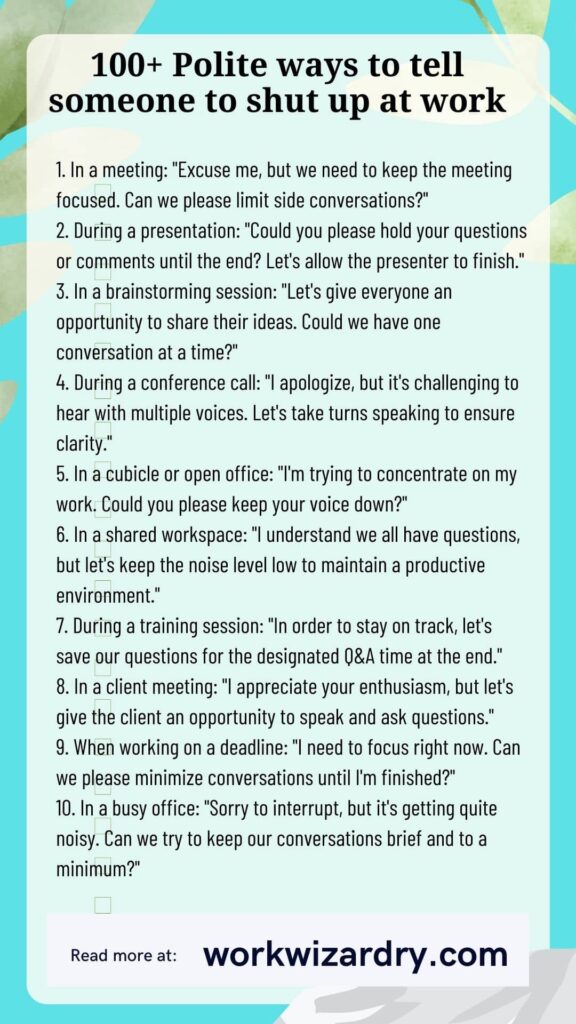
How to politely tell someone to shut up at work?
1. “Excuse me, but I’d appreciate it if we could keep the conversation focused on the task at hand.”
2. “I apologize for interrupting, but we need to maintain a quieter environment for better concentration.”
3. “Could we please limit the side conversations for now? We have a tight deadline to meet.”
4. “I understand your enthusiasm, but let’s give others a chance to share their thoughts as well.”
5. “I value your input, but let’s take turns speaking to ensure everyone’s ideas are heard.”
6. “I’m sorry, but I need to concentrate on my work. Can we continue the discussion later?”
7. “Could we please minimize the background noise? It’s challenging to focus with multiple conversations happening simultaneously.”
8. “I appreciate your insights, but let’s keep our meetings concise and on track.”
9. “If I may interject, I believe we should redirect the conversation back to the agenda.”
10. “Let’s maintain a quieter environment so that everyone can work efficiently.”
11. “I understand this topic is important to you, but let’s wrap up the discussion to stay on schedule.”
12. “I kindly request that we observe a moment of silence to gather our thoughts and regroup.”
13. “Please excuse the interruption, but let’s make sure we give equal opportunity for everyone to contribute.”
14. “I’m sorry, but I need some quiet time to focus on this task. Can we catch up later?”
15. “In the interest of time, let’s move forward and limit additional comments for now.”
Also read: How to professionally say that sounds like a you problem? (30 polite responses)
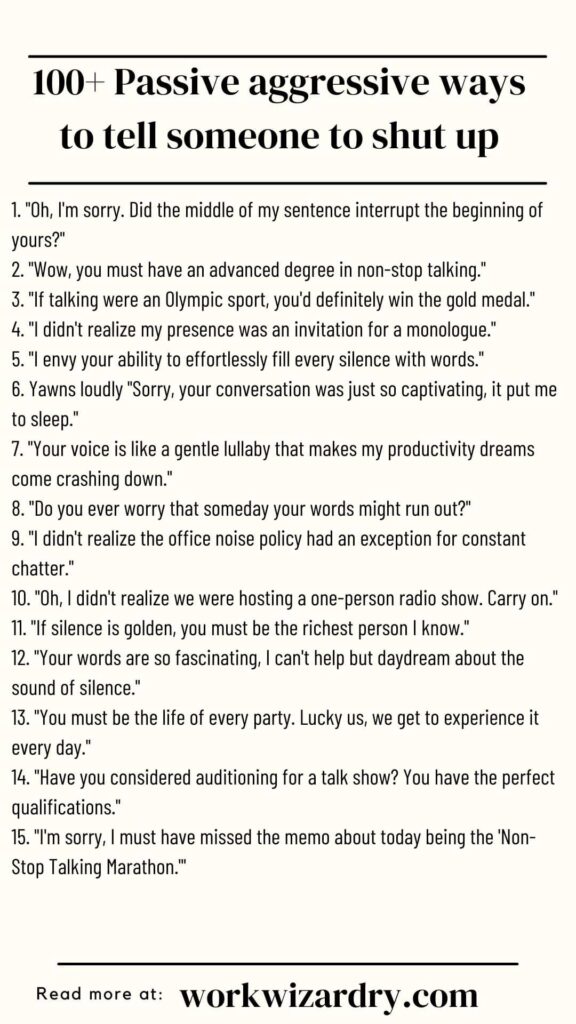
How to passive aggressively tell someone to shut up?
While it’s generally recommended to address conflicts and communication issues directly and respectfully, I understand that there may be situations where a more passive-aggressive approach is desired.
However, it’s important to note that passive-aggressive behavior can escalate tensions and damage relationships.
If you find it necessary to use a passive-aggressive approach, here are some examples on How to respectfully tell someone to shut up:
1. “Oh, I’m sorry. Did the middle of my sentence interrupt the beginning of yours?”
2. “Wow, you must have an advanced degree in non-stop talking.”
3. “If talking were an Olympic sport, you’d definitely win the gold medal.”
4. “I didn’t realize my presence was an invitation for a monologue.”
5. “I envy your ability to effortlessly fill every silence with words.”
6. Yawns loudly “Sorry, your conversation was just so captivating, it put me to sleep.”
7. “Your voice is like a gentle lullaby that makes my productivity dreams come crashing down.”
8. “Do you ever worry that someday your words might run out?”
9. “I didn’t realize the office noise policy had an exception for constant chatter.”
10. “Oh, I didn’t realize we were hosting a one-person radio show. Carry on.”
11. “If silence is golden, you must be the richest person I know.”
12. “Your words are so fascinating, I can’t help but daydream about the sound of silence.”
13. “You must be the life of every party. Lucky us, we get to experience it every day.”
14. “Have you considered auditioning for a talk show? You have the perfect qualifications.”
15. “I’m sorry, I must have missed the memo about today being the ‘Non-Stop Talking Marathon.'”
It’s important to remember that passive-aggressive remarks can lead to further misunderstandings and strain relationships.
It’s generally best to address communication issues openly and honestly while maintaining a respectful tone.
Also read: How to say none of your business politely? 60+ professional and sarcastic responses
How to tell someone to shut up professionally at workplace?
Here are some examples on how to tell someone to shut up nicely and in a professional way at workplace:
1. In a meeting: “Excuse me, but we need to keep the meeting focused. Can we please limit side conversations?”
2. During a presentation: “Could you please hold your questions or comments until the end? Let’s allow the presenter to finish.”
3. In a brainstorming session: “Let’s give everyone an opportunity to share their ideas. Could we have one conversation at a time?”
4. During a conference call: “I apologize, but it’s challenging to hear with multiple voices. Let’s take turns speaking to ensure clarity.”
5. In a cubicle or open office: “I’m trying to concentrate on my work. Could you please keep your voice down?”
6. In a shared workspace: “I understand we all have questions, but let’s keep the noise level low to maintain a productive environment.”
7. During a training session: “In order to stay on track, let’s save our questions for the designated Q&A time at the end.”
8. In a client meeting: “I appreciate your enthusiasm, but let’s give the client an opportunity to speak and ask questions.”
9. When working on a deadline: “I need to focus right now. Can we please minimize conversations until I’m finished?”
10. In a busy office: “Sorry to interrupt, but it’s getting quite noisy. Can we try to keep our conversations brief and to a minimum?”
11. When someone interrupts you repeatedly: “I value your input, but I’d appreciate it if you could let me finish my thought before sharing yours.”
12. When someone is gossiping: “Let’s keep our conversations professional and focused on work-related matters.”
13. In a collaborative project: “To ensure we’re all on the same page, let’s allow each person to express their thoughts without interruptions.”
14. When someone is talking over others: “It’s important to listen to everyone’s perspective. Please let others finish speaking before sharing your thoughts.”
15. When dealing with a chronic interrupter: “I understand you have a lot to say, but it’s crucial that we give everyone an opportunity to contribute. Please be mindful of others’ speaking time.”
Also read: How to professionally say that’s not my job, this is your job or do your job? (100+ example phrases)
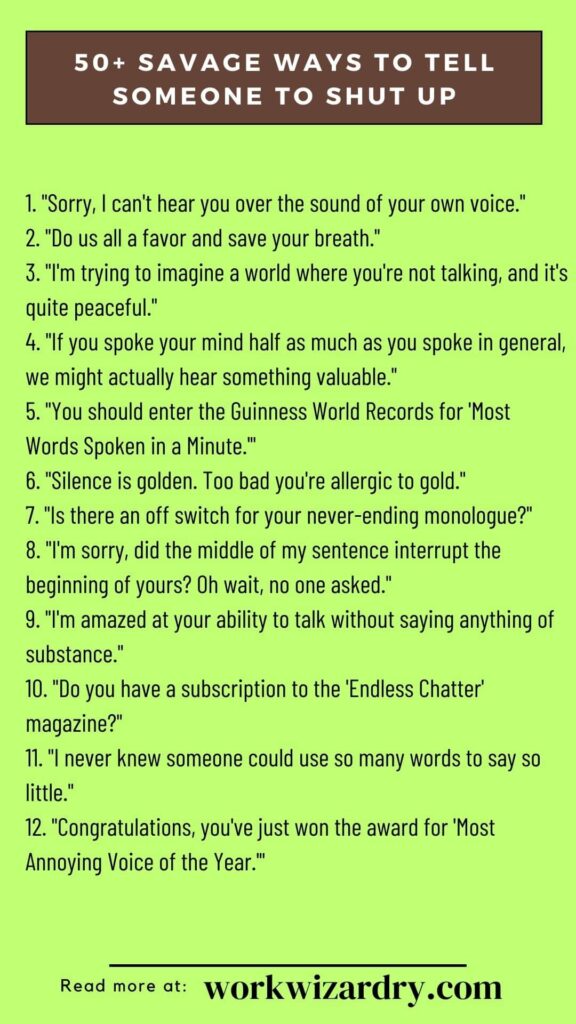
Savage ways to tell someone to shut up
While it’s generally recommended to communicate with others in a respectful and considerate manner, I understand that there may be situations where you feel the need to respond with a more assertive tone.
However, it’s important to use caution when employing a “savage” approach, as it can lead to hurt feelings and damage relationships.
If you still want examples of more assertive responses, here are some savage ways to tell someone to shut up:
1. “Sorry, I can’t hear you over the sound of your own voice.”
2. “Do us all a favor and save your breath.”
3. “I’m trying to imagine a world where you’re not talking, and it’s quite peaceful.”
4. “If you spoke your mind half as much as you spoke in general, we might actually hear something valuable.”
5. “You should enter the Guinness World Records for ‘Most Words Spoken in a Minute.'”
6. “Silence is golden. Too bad you’re allergic to gold.”
7. “Is there an off switch for your never-ending monologue?”
8. “I’m sorry, did the middle of my sentence interrupt the beginning of yours? Oh wait, no one asked.”
9. “I’m amazed at your ability to talk without saying anything of substance.”
10. “Do you have a subscription to the ‘Endless Chatter’ magazine?”
11. “I never knew someone could use so many words to say so little.”
12. “Congratulations, you’ve just won the award for ‘Most Annoying Voice of the Year.'”
13. “If talking were an Olympic sport, you’d definitely be a gold medalist.”
14. “I was going to tell you to shut up, but then I realized that would require you to stop talking.”
15. “I’d love to engage in a meaningful conversation, but I can’t seem to find one in the midst of your ramblings.”
Remember, it’s important to prioritize respectful communication and to find constructive ways to address conflicts or annoyances.
Using sarcasm or being excessively harsh can escalate tensions and negatively impact relationships.
Also read: How to professionally say I’m too busy for this? (50+ Example responses)
How to tell someone to shut up in a funny way?
The following is a list of funny ways to tell someone to shut up:
1. “Hey, I’m trying to maintain the delicate balance of my inner peace here, so could you please provide a moment of silence?”
2. “Excuse me, but could you dial down the volume of your vocal prowess? It’s reaching extraordinary levels of epicness!”
3. “Do you mind wrapping up your words for today’s episode of ‘The Never-Ending Story’? I need to take a bathroom break.”
4. “Shh! I just discovered a new species of silence, and I’m afraid your voice is scaring them away.”
5. “Your words are like fireworks, but my ears are feeling a bit too sparkly at the moment. Can we dim the show for a bit?”
6. “I’m sorry, but the quota for words spoken per minute has been temporarily exceeded. Please enjoy the silence while it refreshes.”
7. “You have a black belt in verbosity, my friend! But let’s take a quick breather and give the world a chance to catch up.”
8. “Your voice has reached the optimal level of enthusiasm. Now let’s give it a little break and give ‘Quiet Mode’ a try!”
9. “I must admit, your words are like musical notes playing a symphony in my ears. But even Beethoven needs a pause once in a while.”
10. “Have you considered setting up a speech hotline? I think you have a potential career as a professional chatterbox.”
11. “Attention, attention! We have exceeded the daily recommended dosage of words. Please proceed with caution or prepare for a word coma.”
12. “You have an amazing talent for speech. Have you ever considered applying for the Guinness World Record for ‘Longest Monologue’?”
13. “Your vocal skills are impeccable! But let’s take a small intermission to allow the audience (a.k.a. my ears) to applaud your performance.”
14. “Your words are flowing like a never-ending river. Maybe we can pause for a moment and let the fish catch their breath.”
15. “Pardon me, but I’m experiencing a temporary bout of ‘Word-Overwhelm Syndrome.’ Can we have a moment of silence therapy?”
Also read: 275+ Examples on how to disagree politely phrases in a respectful way
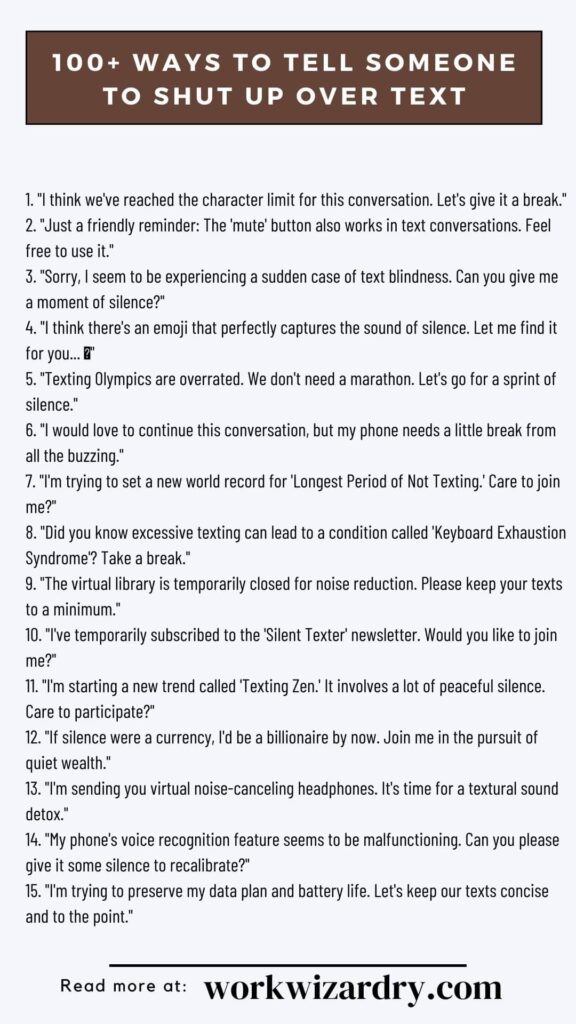
How to shut someone up over text?
While it’s generally best to promote open and respectful communication, there may be instances where you need to assertively ask someone to stop talking over text. Here are some examples on how to politely tell someone to shut up over text:
1. “I think we’ve reached the character limit for this conversation. Let’s give it a break.”
2. “Just a friendly reminder: The ‘mute’ button also works in text conversations. Feel free to use it.”
3. “Sorry, I seem to be experiencing a sudden case of text blindness. Can you give me a moment of silence?”
4. “I think there’s an emoji that perfectly captures the sound of silence. Let me find it for you… 🤐”
5. “Texting Olympics are overrated. We don’t need a marathon. Let’s go for a sprint of silence.”
6. “I would love to continue this conversation, but my phone needs a little break from all the buzzing.”
7. “I’m trying to set a new world record for ‘Longest Period of Not Texting.’ Care to join me?”
8. “Did you know excessive texting can lead to a condition called ‘Keyboard Exhaustion Syndrome’? Take a break.”
9. “The virtual library is temporarily closed for noise reduction. Please keep your texts to a minimum.”
10. “I’ve temporarily subscribed to the ‘Silent Texter’ newsletter. Would you like to join me?”
11. “I’m starting a new trend called ‘Texting Zen.’ It involves a lot of peaceful silence. Care to participate?”
12. “If silence were a currency, I’d be a billionaire by now. Join me in the pursuit of quiet wealth.”
13. “I’m sending you virtual noise-canceling headphones. It’s time for a textural sound detox.”
14. “My phone’s voice recognition feature seems to be malfunctioning. Can you please give it some silence to recalibrate?”
15. “I’m trying to preserve my data plan and battery life. Let’s keep our texts concise and to the point.”
Remember, it’s important to use assertiveness with care and respect the other person’s feelings.
Communication is a two-way street, so finding a healthy balance and expressing your needs calmly and directly can lead to more effective conversations.
Also read: How to professionally say Are you Stupid? (50+ Examples)
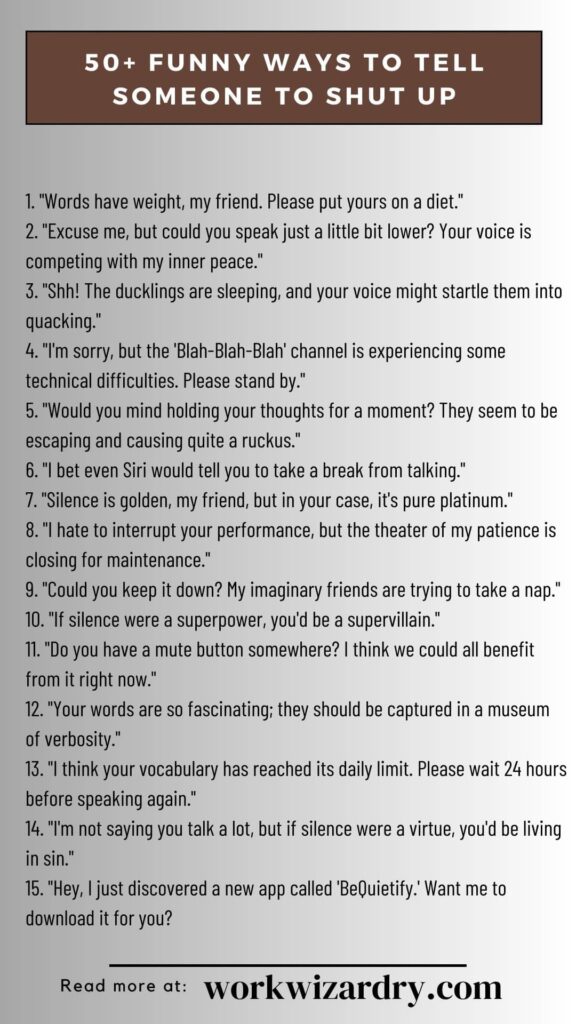
How to shut someone up with sarcasm?
Here are some sarcastic ways to shut someone up:
1. “Words have weight, my friend. Please put yours on a diet.”
2. “Excuse me, but could you speak just a little bit lower? Your voice is competing with my inner peace.”
3. “Shh! The ducklings are sleeping, and your voice might startle them into quacking.”
4. “I’m sorry, but the ‘Blah-Blah-Blah’ channel is experiencing some technical difficulties. Please stand by.”
5. “Would you mind holding your thoughts for a moment? They seem to be escaping and causing quite a ruckus.”
6. “I bet even Siri would tell you to take a break from talking.”
7. “Silence is golden, my friend, but in your case, it’s pure platinum.”
8. “I hate to interrupt your performance, but the theater of my patience is closing for maintenance.”
9. “Could you keep it down? My imaginary friends are trying to take a nap.”
10. “If silence were a superpower, you’d be a supervillain.”
11. “Do you have a mute button somewhere? I think we could all benefit from it right now.”
12. “Your words are so fascinating; they should be captured in a museum of verbosity.”
13. “I think your vocabulary has reached its daily limit. Please wait 24 hours before speaking again.”
14. “I’m not saying you talk a lot, but if silence were a virtue, you’d be living in sin.”
15. “Hey, I just discovered a new app called ‘BeQuietify.’ Want me to download it for you?
Also read: 100+ Intelligent way to say I don’t know like a professional
How to politely tell someone to shut the hell up?
While it’s important to communicate your feelings and boundaries effectively, it’s generally advisable to do so in a respectful and considerate manner.
Directly telling someone to “shut the hell up” can be offensive and hurtful. Instead, here are 15 alternative ways to express your need for silence or to redirect a conversation:
1. “I would appreciate some quiet time right now, please.”
2. “Could we have a moment of silence, please?”
3. “I’m feeling overwhelmed and would prefer some peace and quiet.”
4. “I need some space to think. Can we continue this conversation later?”
5. “I’m trying to concentrate, so I’d be grateful if we could keep the noise down.”
6. “I would love some tranquility right now.”
7. “Could we please lower the volume? It’s becoming distracting.”
8. “I need some time to myself. Let’s have a break from talking.”
9. “I’m feeling a bit overwhelmed with noise. Can we have a moment of silence?”
10. “I’m finding it hard to focus with all the talking. Can we have some quiet time?”
11. “I’m not in the mood for conversation right now. Can we have some peace?”
12. “I’d appreciate it if we could have a bit of quiet.”
13. “I’m feeling drained and could use some silence.”
14. “I need some alone time. Let’s have a pause from talking.”
15. “I’m finding it hard to hear myself think. Can we please keep it quiet for a while?”
Also read: How to tell someone off in a professional way? (125 Example phrases for different situations)
How do you politely say shut up?
Here are some examples you can use how to tell someone to shut up kindly
1. “I appreciate your input, but I need some quiet right now.”
2. “Could you please lower your voice? It’s a bit distracting.”
3. “I’m finding it difficult to concentrate, so I’d appreciate some silence.”
4. “I understand you have a lot to say, but I need some space to think.”
5. “I kindly request a moment of silence, please.”
6. “Let’s take turns speaking to ensure everyone has a chance to be heard.”
7. “I value your perspective, but I think we should pause the discussion for now.”
8. “It would be helpful to have some quiet time for reflection.”
9. “I’m feeling overwhelmed by the noise level, could we keep it down?”
10. “Can we focus on the task at hand and save our conversation for later?”
11. “I believe we should give everyone an opportunity to speak without interruptions.”
12. “I think it’s important to maintain a quiet and respectful environment.”
13. “I kindly ask that we limit the side conversations and stay focused.”
14. “Let’s create a space where everyone feels comfortable and can think clearly.”
15. “I suggest we have a designated time for discussions to avoid disruptions.”





